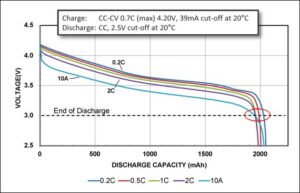Looking to understand what CCA means in battery terminology? Don’t worry, we’ve got you covered! CCA, or Cold Cranking Amps, is a crucial metric used to determine the starting power of a battery, especially in cold weather conditions. It gives you an idea of how well a battery can deliver power to start your vehicle’s engine in low temperatures. So, if you’ve ever questioned what does CCA mean in battery, this article will explore all the essential details you need to know. Let’s dive right in!
What Does CCA Mean in Battery?
If you’ve ever shopped for a car battery or researched automotive batteries, you may have come across the term CCA. But what does CCA mean in battery? CCA stands for Cold Cranking Amps, and it is a critical specification that helps determine the battery’s ability to start your vehicle in cold temperatures. In this article, we will explore what CCA means, how it relates to battery performance, and why it is essential to consider when choosing a battery for your car.
Understanding CCA
Cold Cranking Amps (CCA) is a measurement used to determine a battery’s ability to deliver the required current to start a vehicle’s engine in cold weather conditions. It measures the number of amps a battery can provide at 0 degrees Fahrenheit (-17.8 degrees Celsius) for 30 seconds while maintaining a voltage of at least 7.2 volts.
Why is CCA Important?
Starting a car’s engine requires a significant amount of electrical power, especially in cold weather. Low temperatures can make it more challenging for a battery to deliver the necessary power due to increased resistance in the battery and thickened engine oil. This is where a battery’s CCA rating becomes crucial. Here’s why CCA is important:
1. Reliable Cold-Weather Starts: A battery with a higher CCA rating can deliver more power in cold temperatures, ensuring reliable starts in harsh winter conditions.
2. Overcoming Increased Resistance: When temperatures drop, a battery’s internal resistance increases, making it harder for the battery to deliver power. A higher CCA rating compensates for this increased resistance, ensuring sufficient power for the engine to start.
3. Powering Electrical Accessories: Apart from starting the engine, the battery also powers various electrical accessories when the engine is off. A higher CCA rating means more power is available for these accessories, such as headlights, wipers, and audio systems.
Choosing the Right CCA Rating
To choose the right CCA rating for your vehicle, it is essential to consider factors such as the climate you live in, the specifications recommended by your vehicle manufacturer, and your driving habits. Here are some guidelines to help you choose the appropriate CCA rating:
1. Consult Your Vehicle Manual: Your vehicle’s manual often specifies the recommended CCA rating for the battery. Following these guidelines will ensure optimal performance and compatibility.
2. Consider the Climate: If you live in an area with extremely cold winters, it is recommended to choose a battery with a higher CCA rating. This enables the battery to deliver the necessary power even in frigid temperatures.
3. Account for Your Driving Habits: If you frequently use power-hungry accessories like high-powered audio systems or off-road lighting, it is advisable to choose a battery with a higher CCA rating to meet the increased power demands.
4. Balance Cost and Performance: While a higher CCA rating provides better cold-weather performance, it usually comes at a higher cost. Consider your budget and prioritize based on your specific needs and requirements.
CCA vs. Reserve Capacity
Another important specification to consider when choosing a battery is the Reserve Capacity (RC). RC measures the battery’s ability to provide a constant electrical load before its voltage drops below a specified level. While CCA primarily focuses on cold-starting performance, RC indicates how long a battery can power the vehicle’s electrical systems if the alternator fails.
It is worth noting that a battery with a higher CCA rating may not always have a higher RC rating, and vice versa. Therefore, it is crucial to evaluate both specifications based on your specific requirements.
Importance of Regular Maintenance
To ensure your battery performs optimally and prolong its lifespan, regular maintenance is essential. Here are a few tasks you can perform to maintain your battery:
1. Visual Inspection: Regularly inspect your battery for any signs of corrosion, leakage, or damage. If you notice any issues, it is advisable to have the battery inspected by a professional.
2. Clean Battery Terminals: Over time, corrosion can build up on the battery terminals, affecting the electrical connection. Clean the terminals using a mixture of baking soda and water to remove any corrosion.
3. Check Electrolyte Levels: For batteries with removable caps, check the electrolyte levels regularly. If the levels are low, you can top them up with distilled water if necessary.
4. Test Battery Health: Periodically check your battery’s health using a battery tester or have it tested by a professional. This will help identify any potential issues before they become major problems.
In Conclusion
Understanding what CCA means in a battery is essential to ensure reliable cold-weather starts for your vehicle. Choosing a battery with the appropriate CCA rating based on your climate, vehicle manufacturer’s recommendations, and driving habits will help maximize performance and reliability. Regular maintenance, such as visual inspections, cleaning terminals, and testing battery health, is crucial to prolong your battery’s lifespan and avoid unexpected breakdowns. By considering CCA and practicing proper maintenance, you can ensure your battery provides the power needed to start your vehicle, even in the coldest of winters.
Frequently Asked Questions
What does CCA mean in battery?
CCA stands for Cold Cranking Amps. It is a measurement used to indicate a battery’s ability to start an engine in cold temperatures. CCA is the amount of current a battery can deliver to the starter motor for 30 seconds at 0°F (-17.8°C) without dropping below a specified voltage.
How is CCA different from other battery ratings?
CCA specifically measures a battery’s performance in cold weather conditions, focusing on its ability to start an engine. Other battery ratings, such as reserve capacity or amp-hour (Ah) rating, indicate the amount of time a battery can run accessories without recharging but do not assess cold-start performance.
Why is CCA important when choosing a battery?
CCA is important because cold temperatures can significantly affect a battery’s ability to deliver power. Engines require more electrical power to start in cold conditions, and a lower CCA rating may result in a slow or failed start. A battery with a higher CCA rating can provide the necessary power to start the engine reliably in cold weather.
How does CCA affect battery performance in warmer climates?
While CCA is primarily associated with cold weather, it still has an impact in warmer climates. Higher CCA ratings generally indicate a battery with more robust construction and better overall performance. Even in warmer conditions, a battery with a higher CCA rating will typically have better starting power and may last longer.
Is a higher CCA rating always better?
In general, a higher CCA rating is desirable as it indicates greater starting power. However, it’s important to select a battery with a CCA rating suitable for your vehicle’s requirements. Consult your vehicle’s manual or speak to a professional to determine the appropriate CCA rating for your specific vehicle model. Choosing a battery with an excessively high CCA rating may not provide any additional benefit and could lead to unnecessary costs.
Final Thoughts
CCA, or Cold Cranking Amps, is a crucial specification to consider when choosing a battery. It measures the battery’s ability to start an engine in cold temperatures. The higher the CCA rating, the better the battery’s capability to deliver power in cold conditions. Understanding what CCA means in a battery is essential as it ensures a reliable start even in harsh weather conditions. So, next time you’re shopping for a battery, keep in mind the importance of CCA to ensure optimal performance and reliability in cold weather.




